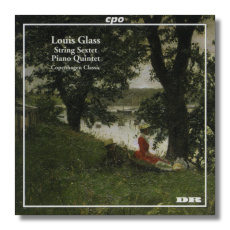
The Internet's Premier Classical Music Source
Related Links
- L. Glass Reviews
- Latest Reviews
- More Reviews
-
By Composer
-
Collections
DVD & Blu-ray
Books
Concert Reviews
Articles/Interviews
Software
Audio
Search Amazon
Recommended Links
Site News
 CD Review
CD Review
Louis Glass

Chamber Works
- String Sextet in G Major, Op. 15 (1893 – 32:46)
- Piano Quintet in C Major, Op. 22 (1898 – 38:03)
Copenhagen Classic
CPO 777062-2 70:47
This is a very pleasing and impressive new release from CPO. Louis Glass is an obscure Danish late-romantic composer whose inspiration springs from the heart of the Romantic era. Not one to experiment in the emerging environment of atonal and neo-classical music, his old-fashioned compositions were swept aside well before his death.
Fortunately, the last few years have seen Glass' star rise out of the ashes. Danacord has released the 6 Symphonies, DaCapo a disc of two of Glass' String Quartets, and now we have the String Sextet and Piano Quintet courtesy of CPO and Copenhagen Classic. Although this is not a wealthy discography, it does give Glass some well-deserved exposure.
Our composer was born in Copenhagen and began his musical training as a young boy under the tutelage of his father who was a composer of miniatures and owner of a piano music academy. Eventually, Glass became a student of Niels Gade, the most influential composer in Denmark. Since Gade styled his music after Mendelssohn and Schumann, Glass' musical education was entirely traditional. A radical change for Glass took place starting in 1889 when he traveled throughout Europe, soaking in the music of Wagner, Bruckner, Franck, and Strauss. When he returned to Copenhagen, Glass was a converted late-romantic composer. He co-founded two musical societies having the aim of presenting Danish music and unknown modern compositions to the public, and his influence in the musical world of Denmark flourished. With the First World War, the late-romantic bubble burst, and Glass' musical aesthetic totally lost its appeal. In contrast, his compatriot Carl Nielsen was gaining in popularity with music that reflected the great cultural changes after the First World War. For better or worse, once the 'derivative' tag is assigned to a composer, the reputation takes a nose-dive.
The works on the CPO disc reveal a splendid musical mind that offers tightly constructed arguments and a wealth of thematic invention. What makes the themes particularly compelling is how well Glass varies music of energy and tension with sweetly poured passages; the contrast is frequent and consistently interesting. The melodies themselves, although comely, are not likely to leave listeners humming passages a few hours after hearing the music. But there is a 'rightness' and natural progression to the stream of melodies that this reviewer finds most reassuring. Glass' Symphonies have a tendency to meander and lose some cohesion, but none of that is in evidence in the String Sextet or Piano Quintet.
Both works are in the traditional four movements, and each one is distinctive and highly rewarding. The Sextet is an excellent piece; among its many highlights are the rugged and sinister main themes of the 1st and 3rd Movements, the haunting images of the Scherzo's trio section, and the cyclic return of the main theme of the 1st Movement towards the end of the work.
When turning to the Piano Quintet, we find Glass at his artistic peak. In addition to the piano part's expert integration into the musical fabric, Glass' depth of expression is admirable, and the melodic lines are among his most captivating. The 1st Movement Allegro has ceremonial activities as its foundation, while a 'Theme and Variations' 2nd Movement Adagio displays passionate and wide deviations from the basic theme. The 3rd Movement Allegretto scherzando has an ominous and highly energetic primary theme followed by the sweet refrains of the trio. It is the final movement of the Piano Quintet that I find rather astounding for its exceptional cohesion, myriad of compelling themes, improvisatory elements, and rapturous emotional content; this ten-minute movement alone is worth the price of the disc.
Copenhagen Classic is a string sextet ensemble from Denmark that had its debut in 1997. Although there are no comparison recordings of either the Sextet or Quintet, I am confident that the group gives this music all the lyricism and angst that can be derived from the scores. Sonics are excellent and contribute to the overall appeal of the recording.
Don's Conclusions: A beauty of a disc that I strongly recommend to anyone with a warm spot for romantic chamber music. Louis Glass might not be one of the great composers, but he comes very close in these two superb chamber works. When the year comes to its conclusion, I expect that this CPO disc will among my most rewarding acquisitions.
Copyright © 2005/2006, Don Satz




















